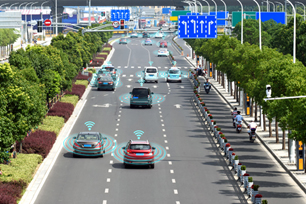The technology that is shaping the transport industry
When we talk about the radical developments in technology today, we can't help but be amazed by the kind of effects digitisation has on our daily lives. The transport industry is no stranger to various technology trends, and here, Cheryl Chandola examines just some that will impact transport in the future.
ITS: Intelligent Transport Systems
Perhaps at the forefront of new technology that will greatly affect the industry is what we call Intelligent Transport Systems, or ITS. It’s not a concept as a whole, but rather a collection of numerous technologies aimed to make transport more ‘intelligent’ and adaptable to the demands of society.
According to Gov Tech, ITS includes concepts such as alternative fuel, keyless fleet management, autonomous vehicles and traffic analytics. ITS aims to converge and help these systems interrelate in order to make more manageable transport systems for everyone.
ITS effectively transforms the transportation industry into an efficient component of what is known as city-as-a-system. This allows traffic and transport to integrate seamlessly throughout the city.
Here are some specific transport technologies that are shaping the transport industry:
1. Transport pods
If we’re looking for technology that might finally pave the way for vehicle-less roads, then transport pods may be part of the solution. Some unique features of transport pods include:
- Their movement - guided by rail lines of sorts that lead to various destinations.
- Their design - tyres made out of rubber, and battery powered operation.
- They capacity - they can fit around four at a time, including luggage.
2. Boosted boards
Boosted boards aim to provide great modifications to the commuting experience. These minimalistic ‘vehicles’ can provide a faster, more efficient means of transport for passengers. The sleek, artistically designed board does much more than maintain balance:
- It’s usable almost anywhere - use it in school, in an airplane, at home, or even on the metro.
- The boosted boards of today provide efficiency with a variety of features - much more than those that have been built in the past.
- When applied with smart technology, boosted boards can help make transport much more manageable.
 3. Connected, autonomous vehicles
3. Connected, autonomous vehicles
The idea of connected and autonomous vehicles relies on those vehicles communicating with one another via wireless technology. These novel types of technology include the following:
- Vehicle-to-Vehicle (V2V) - where vehicles can communicate and indicate where they are with respect to one another.
- Vehicle-to-Pedestrian (V2P) - where vehicles have sensors to indicate the presence of pedestrians.
- Vehicle-to-Infrastructure (V2I) - where vehicles have the capability to sense the presence of infrastructure nearby.
When made efficient and global, autonomous vehicles can add an extra layer of safety for commuters, drivers and cargo alike, as vehicles are now slowly forming into an ‘intelligent’ network.
4. Driving data - smart cities
With the rise of autonomous vehicles comes the rise of data-based traffic and smarter cities. Thanks to smarter transportation technology, we now have multiple benefits:
- These connected vehicles we’ve described earlier constantly transfer data from vehicle, to pedestrian, to infrastructure - all in order to create a fast paced, constantly adapting society.
- Likewise, experts and officials can use and interpret real time transportation data. This can vastly make improvements to traffic and provide a smarter means of travel and transport for multiple industries.
5. Tubes
Pioneers such as Elon Musk and his Boring Company are just some who want to use the power of fast-paced travel in order to provide convenient transport for the public. If proven efficient, tube transportation can be the next step to fast-paced travel that won't cause the hassle of traffic. The two most popular fast paced tubes include:
- Maglev trains by Evacuated Tube Transport (ETT) - these can reach speeds around 600km/h, meaning that international trips will only take a few hours. This is helpful for quick transport, especially for people who want to work in different countries.
- Terraspan - uses the concept of superconducting tunnels in order to generate super-fast travel. They provide zero-loss transmission of electricity thanks to the infrastructure needed.
As technology slowly aims for a more connected society, industries are inevitably on the brink of adjusting to various trends that can greatly benefit various aspects of our lives. In the case of transportation, the technologies indicated above are just some of the many things that can greatly influence the transport industry in the years to come.


